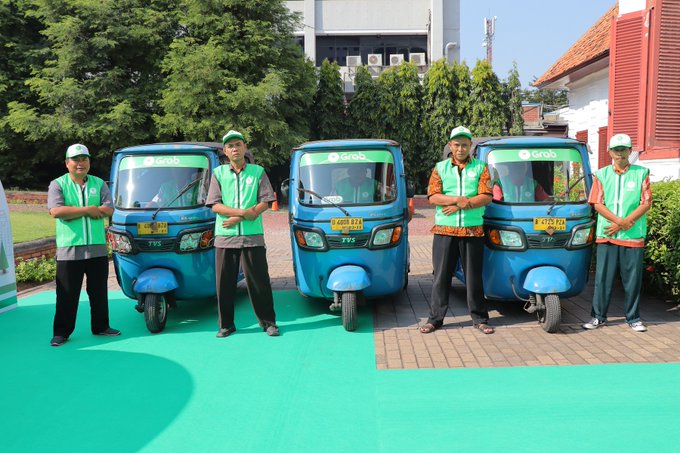Three-wheel auto rickshaws, locally known as bajaj (named after their manufacturers, India-based Bajaj), have long been a feature of Jakarta’s public transport scene. Independently operated by drivers, the small taxis have often lacked regulation, such as fixed fares, but some bajaj in the city are now catching up with modern technology.
Singapore-based app Grab, which has a huge presence in Indonesia primarily thanks to its online motorcycle taxi and ride-hailing services, is tapping into the three-wheeler market with a new service, GrabBajay, which was launched in the capital yesterday. The service, launched in collaboration with the Jakarta Transportation Agency, allows users of the Grab app to hail bajaj just like they would a car or a motorcycle.
“We really appreciate Grab’s initiative and hope this integrated collaboration will be sustainable so it can become one of the favorite choices of transportation for Jakarta citizens as well as tourists,” Massdes Aroufy, Head of Road Transport at the Jakarta Transportation Agency, said in a press release.
That said, the service is only available at five notoriously traffic dense points in Central Jakarta, namely Jakarta Kota train station, ITC Mangga Dua, Mangga Besar train station, Sawah Besar train station, and Pasar Baru. As such, the launch of GrabBajay does not spell the end for existing bajaj vehicles elsewhere in the city.
As with regular bajaj, GrabBajay can only accommodate two passengers per trip. The service alleviates the need to haggle over price as passengers are automatically charged IDR3,000 (US$0.21) per kilometer driven.
There were concerns that bajaj would be phased out in Jakarta due to the emergence of motorcycle taxis operated by ride-sharing apps like Grab and Indonesia’s Go-Jek. While many drivers say their income decreased rapidly over the years, bajaj still remain in many parts of the city offering an option to both transport more than one passenger at a time while still being able to zip-zap through traffic due to the vehicles’ small size.





Reader Interactions